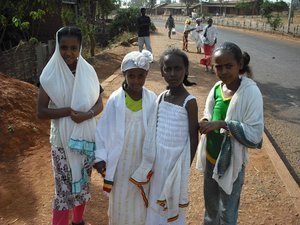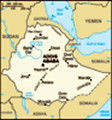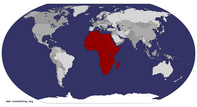Advertisement
Published: March 27th 2009

 The Curious Girls
The Curious Girls
Happy, Bemused, NotSure and What-U-Talking-About-Fool?BIG DISCLAIMER: After some feedback from part #1 I should add that the UN work in a lot more difficult places than Ethiopia so their advice is one size fits all. That said, parts of Ethiopia are a bit hairy and neither volunteers or tourists are allowed (or supposed) to visit these areas.
As far as we are concerned - and we have both said it - walking around Addis Ababa at night feels safer than walking around Fishponds in Bristol. By some margin.
Unlike the UK, the Police are still respected (and perhaps feared). Unlike the UK, older people are still given respect. And, unlike the UK, foreigners are still treated with respect.
Yes, the roads are problematic, but hire a local driver who is used to goats, donkeys and humans springing out in front of you at short notice.
Personally I would not drive in Ethiopia but then I am sure the M32/M4/M5 would be equally scary for most Ethiopians, where I am happy to drive!
Rights of Passage On that note, and digressing somewhat before continuing with the rest of the UN update, I have remarked on more than one occasion on

 Our destination
Our destination
Inzy Hill - landmark of Assosathe differences between the law of the road here, and the law of the road in the UK.
Here you avoid animals. If you kill a cow, donkey, sheep or goat you are supposed to find the owner and pay him or her the going rate for the animal. It is your fault. Even if it jumped out in front of you at the last minute.
As the UN briefing mentioned, drivers have been shot at by shepherds after wiping out a sheep. Your best bet is drive to the nearest Police station and report it.
If you kill a human then boy-oh-boy, hope you are near a town with police. Mob rules, and we have been told of firsthand accounts of police having to save bloodied truck drivers from a mob having knocked over a pedestrian.
Of course - and I have explained this to guys here - in the UK if a farmer lets his/her animals stray onto a road and you knock it down it is the farmer who is held responsible for not managing his animals. He has to pay for the damage to the car (well I guess insurance might) rather

 Inzy summitted!
Inzy summitted!
Sherpa Tenzing drinking can of Special Brew just out of shotthan the driver paying for damage to his cow or whatever!
It seems strange that with the roads being asphalted to provide better access for cars, that animals still have the right of way.
And then again there hasn't been a generation of people brought up by a giant Darth Vader in a green jump suit teaching road safety slogans over here.
In fact, I am always amazed by the surprise I see on people's faces as they walk out in front fo a car and have to jump back pretty sharpish.
We have also been told, though it may be a myth, that some people consider it good luck to walk across a road in front of a car at the last minute! Though I suspect whatever luck you generated would be used up by the very fact you survived!!!
***********************************************************************************
"I confess; George Bush made me do it" Hostage survival was up next, starting with the differences between hostage taking, abduction and kidnapping....
...can you guess?
All deprive you of your liberty, but
1. Hostage taking - demands involved (money or actions)
2. Abduction - taken for a

 Time for a rest...
Time for a rest...
Mestawet, Mihret and Sinkinesh provide pleasant companypurpose, usually for marrying
3. Kidnapping - no demands, just taken
The UN's policy on ransoms - they DON'T PAY - was reiterated.
Unfortunately (or fortunately for the hostages) family members have coughed up in the past for UN staff and the press have reported that ransoms HAVE been paid. Clearly if the UN paid a ransom, the developing world would descend into a hostage-holding circus and the UN would go bust in a matter of months.
The general points indicated that every hostage situation is different and there are no hard and fast rules of behaviour, but there are some steps to minimise detention and enhanced your ability to cope until released.
Resistance is Futile Your call but they don't recommend it unless you want to be blindfolded, drugged and be at the butt end of some unpredictable captor violence.
The first 15-45 minutes of a hostage situation are the most dangerous - your captors will be highly emotional. Your objective is to SURVIVE this period.
Control your fears, recognise your reactions; fear of injury or death is natural.
If you get through the first 45 minutes the next few hours

 ...enjoy the view...
...enjoy the view...
Sara takes a time outwill be the worst for anxiety, but this will reduce as you realise you are alive for now. From now on depression and helplessness will be with you constantly (as a Bristol Rugby fan that's not a new place to be).
We don't need another hero Accept your situation and keep a low profile. Non-verbal communications are important. Don't argue, act neutral. Don't speak unless spoken to. Don't make suggestions as your ideas may go wrong and you get the backlash.
If you try and escape your pals in detention may get it if you DO escape; and/or you will all get it if you fail. Your fellow hostages must agree if you are going to make a break for it.
If you do escape dressed as a German, don't say "Thank You" when wished good luck in English.
Try and gain respect and sympathy by reinterating your status as a humanitarian worker, build bridges by talking about family. Your captors should view you as a human worthy of compassion and mercy.
I am a rock Expect isolation. No clock or calendar.
Maintain a routine, take exercise, keep active mentally (remember favourite

 ...shoot the breeze...
...shoot the breeze...
Was it something Sara said?books, movie plots), maintain humour and think positively.
Ask for a book or newspaper but don't demand the Bristol Evening Post, a copy of Four-Four-Two and the FHM that had Britney as the centre spread. Keep your requests realistic.
Drink and eat when possible, even if you have lost your appetite.
Here come the cavalry If rescued by force, don't stand up waving your arms shouting "over here".
Get under cover, hands over head and talk first, move slowly. ID yourself as a hostage.
Once safe expect some post-trauma problems. Talk about it. Expect emotional problems - you are a normal person having a normal reaction to an abnormal situation.
Hmmm.
Say no more.
Danger! UXB! The final section of the workshop concentrated on landmines and unexploded ordinance. Parts of Ethiopia are still mined from wars against Eritrea and Somalia under previous regimes. Floods often expose these mines.
Mines fall into small anti-personal ones or larger anti-tank mines. We were shown pictures of various types and films on how to react. The common warning signs were shown as were common hiding places...
We were also shown some particularly
unpleasant CCTV footage from the Madrid train bombing, a check point bomb going off and a backpack bomb in somewhere like Turkey.
In the backpack case, it looked like someone had fallen down and people all gathered around and took an interest before and suddenly everyone disappeared.
Whole people just disappeared!
I guess the message there is don't be a good samaritan to people wearing backpacks in Turkey...!
In fact, we were warned that often bombers use secondary devices. The primary device gets the target and the secondary a few minutes later gets the bystanders and rescue teams that come to clear up the primary blast.
Captain, I'm picking up a distress signal... The following morning a bunch of drivers from various agencies and er, me, rocked up at the UNHCR compound in Assosa for an hour or two of UN radio training.
We looked at High Frequency (HF) radio transmissions, which are similar to BBC or other radio transmissions. The maximum transmission distance can be a whopping 15,000km! The signal bounces off the ionosphere, but is affected by the time of day and solar activity, which in turn affects which frequencies
(1.6 -3.0 MHz) you must use.
Each UN car has an HF radio transmitter/receiver installed and a big wobbly arial attached to the front of the vehicle.
Then we looked at VHF (higher frequency) radios for short, line-of-sight transmissions. These are hand-held radios operating in the 30-300MHz range.
We learnt the call sign rules and were told one of the official UN languages must be used when transmitting (e.g. English) so that all listening UN staff can understand. A radio room in Addis tracks all UN cars on missions by radio, depending on the Security Phase of the area of operations.
Finally we went outside and tested a HF radio in one of the UN cars, a VHF hand held and a Thuraya satellite phone.
It was great fun!
In fact, all joking aside, the whole workshop was very, very professionally delivered. The DSS representative, a woman from Zimbabwe was very impressive...
...but having re-read it I imagine you are either thinking "come on, where's the news from Assosa?" or that's my kids/friends/family in Ethiopia - is it safe???
Well, as Dustin Hoffman knows, that's a tricky question to answer.
Remember

 Mobile reception? No problem!
Mobile reception? No problem!
...but bet the "line is busy now - please try again later"VSO are ultra-cautious as we don't have the UN radios, cars, drivers, guards, escorts and fortified compounds. We are not allowed into the dodgy parts of the country.
And then again, with workshops like these, we are better warned and prepared for any, albeit unlikely, difficult circumstances.
News From Assosa So here you go.
We had, yes - take a seat and mop your astounded brow - our first VSO volunteer visitor to Assosa since we arrived!! Carol - who arrived in Feburary and is placed in Nekemte - made it over to us on a bus.
Fair play, she was up at the crack on Saturday to arrive just after lunch (6-7 hour journey), walked up Inzy Hill, ate some food, drank some beer and was up again on Sunday morning at 5am for the bus back to Nekemte.
No sign of visitors from the UK yet, but we are expecting Sara's mum, Dee, and husband Dave, in April over from Ireland and boy are we excited to have visitors! I was packed off to Addis for my dental appointment with a shopping list as long as my arm and a wadge of
saved birr for their visit.
We have already had a few of the visitors we expected to come cry off, so we are fully expecting a few of those we DIDN'T expect to come to make the trip.
So, you know, if you fancy a rather out-of-the-way holiday we have a spare mattress and mossie net 😉
What's that?
Don't invite people to holiday here after a blog entry on hostage and hijack procedures???
....quick, best I stick some nice pictures in of us walking up hills and sitting on rocks... 😊
And remember - it's just like first aid training; you get told what to do and the potential horror stories but you hope and expect you'll never need to do it.
Advertisement
Tot: 0.079s; Tpl: 0.012s; cc: 6; qc: 24; dbt: 0.0275s; 1; m:domysql w:travelblog (10.17.0.13); sld: 1;
; mem: 1.1mb















